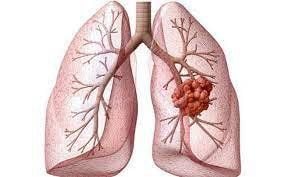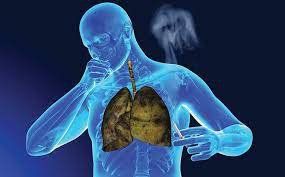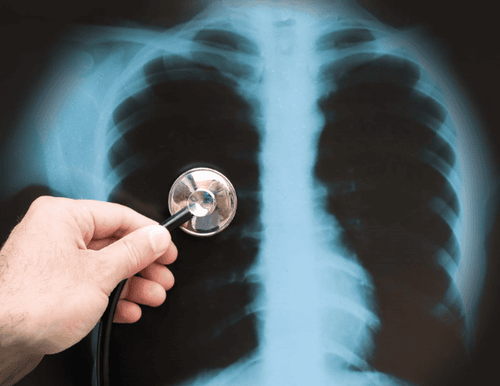This is an automatically translated article.
Post by Master, Doctor Mai Vien Phuong - Gastrointestinal Endoscopy - Department of Medical Examination & Internal Medicine - Vinmec Central Park International General Hospital.Pneumonia is a common lung infection. It can be caused by bacteria, viruses or fungi. If you have lung cancer, you have a higher risk of developing pneumonia. This article helps you learn about the symptoms of pneumonia in people with lung cancer, and the treatment options to prevent it.
1. Symptoms of lung cancer and pneumonia
The symptoms and causes of pneumonia are the same, regardless of whether you have lung cancer or not. Bacterial, viral, and fungal infections can all cause pneumonia.
However, it can be more difficult to identify pneumonia if you have lung cancer. Many of the symptoms of pneumonia can resemble symptoms or complications of lung cancer.
Trắc nghiệm: Hiểu về phổi của bạn
Phổi là một tạng lớn rất quan trọng và không thể thiếu trong cơ thể. Việc giữ cho lá phổi của bạn luôn khỏe mạnh, tránh khỏi những bệnh phổ biến về phổi là điều bạn cần lưu ý để giúp cơ thể bạn có thể vận hành tốt. Hãy cùng chúng tôi trả lời nhanh những câu hỏi trắc nghiệm sau sẽ giúp bạn hiểu về phổi của bạn hơn.
Bài dịch từ: webmd.com
The following content is prepared under supervision of Thạc sĩ, Bác sĩ y khoa, Nguyễn Huy Nhật , Nội Hô hấp , Khoa Khám bệnh & Nội khoa - Bệnh viện Đa khoa Quốc tế Vinmec Đà Nẵng
2. Causes of Pneumonia Pneumonia has three main causes, which are:
Bacteria Virus Fungus Viruses cause 1/3 of all pneumonia cases in the US each year. Some viruses that can cause pneumonia include:
Influenza Herpes simplex Rhinovirus Respiratory syncytial virus In addition, Mycoplasma pneumoniae can cause pneumonia. Mycoplasma is a bacteria that frequently causes respiratory infections. This type of pneumonia is sometimes called “atypical” pneumonia. Chemicals can also cause pneumonia. Certain gases, chemicals, or too much dust can irritate your nose and airways, increasing your chances of developing pneumonia. Having one type of pneumonia doesn't prevent you from getting the second. In fact, people who develop viral pneumonia are at higher risk of developing a bacterial infection.
3. Risk factors Anyone can get pneumonia, but certain risk factors increase the odds. One of those factors is lung cancer. People with lung cancer frequently get pneumonia. The following risk factors also increase the risk of pneumonia:
A chronic lung disease, such as chronic obstructive pulmonary disease (COPD) and cystic fibrosis. Smoke. Recent respiratory infections, including pneumonia, colds, flu, or laryngitis. Complications, such as heart disease, diabetes, cirrhosis, and kidney disease A recent surgery or hospital stay.

Perform a physical exam Use a stethoscope to listen to your chest as you breathe Take a chest X-ray Ask for blood tests If you have lung cancer, your doctor may pneumonia is more difficult to diagnose. Examine and detect abnormalities if you have lung cancer. In either case, you may experience wheezing or crackles (sounds heard with a stethoscope in your lungs) during a lung exam. A chest X-ray may show areas of opacity or opacity.
Your doctor may need to order additional tests to confirm the diagnosis. These tests will also help your doctor determine the severity of the infection and help narrow down treatment options. These additional tests include:
An arterial blood gas test to measure the amount of oxygen in the blood. A capillary oxygen test to measure the amount of oxygen moving from your lungs into your bloodstream. CT scan to see abnormalities more clearly. Sputum culture test, which involves analyzing the mucus or phlegm you cough up to help your doctor determine the cause of your infection. Get a blood culture to make sure that no dangerous infectious organisms have entered your bloodstream. 5. How to treat pneumonia? If you have lung cancer and develop pneumonia, your treatment will be the same as for someone with pneumonia without lung cancer. The most important thing is to treat the cause of the pneumonia.
You may need to stay in the hospital for intravenous (IV) antibiotics or treatment at home with oral antibiotics. In most cases of viral pneumonia, treatment will focus on supportive care, such as supplemental oxygen, intravenous fluids, and rest.
Your doctor will consider other factors to determine if you need to stay in the hospital for treatment, including:
Your age Your overall health and other medical problems Severity of symptoms Your vital signs, including temperature, respiratory rate, blood pressure, and pulse. 5.1. Treating pneumonia at home If you can safely treat your pneumonia at home, your doctor may prescribe antibiotics. Antibiotics you can take at home include:
azithromycin (Zithromax) levofloxacin (Levaquin) cefpodoxime doxycycline The following are important for successful home treatment:
Rest Drink plenty of fluids Eat healthy, balanced meals by Follow your doctor's instructions, including taking all antibiotics even if you start to feel better 5.2. Treating pneumonia in the hospital If you have treatment in the hospital, in addition to taking medicine to treat your infection and symptoms, your doctor will likely give you extra fluids to help stay hydrated.
In many cases, they will provide an antibiotic that can treat many types of bacterial infections. This is also known as a broad-spectrum antibiotic. You will take this medicine until the results of a sputum culture can confirm the microorganism that is causing your pneumonia.
If the test results show that the virus is causing your pneumonia, antibiotics will not treat the infection. Antiviral medications may be helpful. If you have signs of low blood oxygen levels, your doctor may prescribe oxygen to increase the amount of oxygen in your blood.
The doctor may also prescribe medication to treat symptoms such as chest pain or cough. They may have a respiratory therapist work with you to help clear the secretions and open the airways. This can help improve your breathing.

6. What is the outlook? Lung cancer is the leading cause of cancer death in men and women in the United States. An estimated 150,000 people die from lung cancer each year. Infections, including pneumonia, are the second most common cause of death in people with lung cancer.
Pneumonia can be a serious lung infection. If you don't get the proper diagnosis and treatment, it can lead to serious complications and even death. This type of infection is especially concerning for people with lung cancer because their lung function has been compromised.
7. Prevent pneumonia Here are 5 things you can do to help prevent pneumonia:
Get vaccinated against the flu: The flu is a common cause of pneumonia. Getting vaccinated will help you prevent both flu and pneumonia infections. Don't smoke: Smoking is the leading risk factor for lung cancer in the United States. If you have lung cancer, your doctor may have talked to you about not smoking. If you haven't considered it yet, now is the time. Smoking seriously damages your lungs and reduces your body's ability to heal and fight infections. Wash your hands: Wash your hands often, after sneezing or coughing, and avoid people who are sick. Because your immune system is already weakened by cancer, it's especially important that you try to protect yourself from germs. Stay healthy: A cancer diagnosis requires you to pay attention to your health. Rest regularly, eat healthy, and exercise when your body allows. Approaching an overall healthy life can help your body in many ways, especially when you have cancer. Ask your doctor about the pneumonia vaccine, especially if you are over 65 years old or have been diagnosed with cancer. In summary, pneumonia is a common lung infection. It can be caused by bacteria, viruses or fungi. If you have lung cancer, you have a higher risk of developing pneumonia. Therefore, you need to take the above methods to prevent pneumonia if you have lung cancer.
In particular, lung cancer screening is the most effective measure for you to detect and promptly treat lung cancer, protect your health and life. Currently, Vinmec International General Hospital has a Lung Cancer Screening Package with many outstanding advantages such as:
A team of highly qualified and experienced doctors. Comprehensive professional cooperation with domestic and international hospitals: Singapore, Japan, USA, .. Comprehensive treatment and care, multi-specialty coordination towards individualizing each patient. Having a full range of specialized facilities to diagnose the disease and stage it before treatment: Endoscopy, CT scan, PET-CT scan, MRI, histopathological diagnosis, gene-cell testing, .. Full range of main cancer treatment methods: surgery, radiation therapy, chemotherapy, stem cell transplant... When registering for the Lung Cancer Screening Package at Vinmec, customers will receive:
Examination respiratory specialist Low-dose computed tomography lung cancer screening
Please dial HOTLINE for more information or register for an appointment HERE. Download MyVinmec app to make appointments faster and to manage your bookings easily.
References:
Lung cancer fact sheet. (2018). lung.org/lung-health-and-diseases/lung-disease-lookup/lung-cancer/learn-about-lung-cancer/lung-cancer-fact-sheet.html Mycoplasma pneumoniae infection. (2018). cdc.gov/pneumonia/atypical/mycoplasma/ Nichols L, et al. (2012). Causes of death of patients with lung cancer. archivesofpathology.org/doi/pdf/10.5858/arpa.2011-0521-OA Pneumonia. (n.d.). lung.org/lung-health-and-diseases/lung-disease-lookup/pneumonia/















